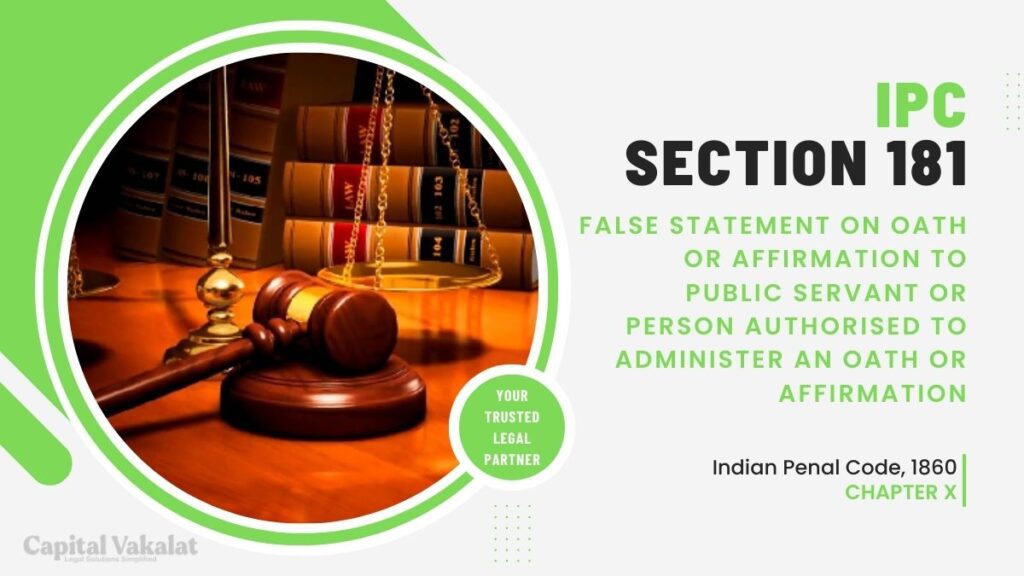In the realm of criminal law in India, Section 181 of the Indian Penal Code (IPC) deals with false statements made on oath or affirmation to a public servant or a person authorized to administer an oath or affirmation. This provision serves to maintain the integrity of legal proceedings, ensuring that individuals provide truthful information when required.

In this article, we will delve into the nuances of Section 181 IPC, its legal implications, penalties, and its significance in upholding the sanctity of the legal system.
Understanding Section 181 IPC
Section 181 of the IPC pertains to the making of false statements, either on oath or affirmation, before a public servant or a person authorized to administer an oath. This section is a pivotal element in safeguarding the authenticity of statements provided during legal or official processes. It applies to individuals who knowingly make false statements with the intent to deceive or mislead.
The Legal Implications
The legal implications of a false statement under Section 181 IPC can be severe. Such statements can hinder the course of justice, obstruct legal investigations, and result in miscarriages of justice. It is crucial to recognize the potential consequences of providing false information in legal proceedings.
Penalties for False Statements
Individuals found guilty of making false statements under Section 181 IPC may face penalties that can include fines and imprisonment. The severity of the penalty can vary depending on the nature and impact of the false statement. It is essential to understand that the legal system takes false statements seriously.
Who Can Be Charged Under Section 181 IPC?
To comprehend the scope of Section 181 IPC, it’s important to identify who can be charged under this provision. This includes both the person making the false statement and the person receiving it. Let’s explore the roles of a public servant and a person authorized to administer an oath or affirmation.
The Role of a Public Servant
A public servant, in the context of Section 181 IPC, refers to any government official or authority entrusted with public duties. They have a responsibility to ensure that the information provided to them is accurate and truthful. In case of false statements, they can initiate legal action under Section 181 IPC.
Person Authorized to Administer an Oath
A person authorized to administer an oath or affirmation can include judges, notaries, magistrates, and other officials who have the legal authority to take sworn statements. They play a crucial role in upholding the sanctity of oaths and affirmations, and any false statements made before them can lead to legal consequences.
Proving False Statements
Proving a false statement under Section 181 IPC can be challenging but not impossible. The burden of proof lies with the prosecution, and they must establish that the statement was indeed false, made knowingly, and had the intent to deceive.
Case Studies
To better understand the practical application of Section 181 IPC, it’s instructive to examine real-life case studies where individuals faced legal consequences for making false statements under oath. These examples illustrate the significance of this provision in upholding justice.
Challenges in Implementing Section 181 IPC
While Section 181 IPC is essential, there are challenges in its implementation. False statements are not always easy to detect, and the legal process can be time-consuming. Identifying and addressing these challenges is crucial for an effective legal system.
Reforms and Amendments
Over the years, there have been discussions about potential reforms and amendments to Section 181 IPC. The objective is to make the legal process more efficient and ensure that false statements are dealt with effectively.
The Importance of Truthfulness
Section 181 IPC underscores the importance of truthfulness in legal proceedings and official documents. Upholding the sanctity of oaths and affirmations is essential to ensure a just and fair legal system.
Consequences of False Statements
The consequences of making false statements can extend beyond legal penalties. It can damage one’s reputation, credibility, and trustworthiness. Moreover, it can have a detrimental impact on ongoing legal proceedings.
Conclusion
In conclusion, Section 181 IPC serves as a vital provision in maintaining the integrity of the legal system in India. It emphasizes the importance of providing truthful information during legal proceedings. False statements, made on oath or affirmation to a public servant or a person authorized to administer an oath, can have severe legal implications. Upholding the sanctity of truth in legal matters is essential for a just and fair society.
Frequently Asked Questions
Who can be charged under Section 181 IPC?
Both the person making the false statement and the person receiving it, such as a public servant or an authorized person administering an oath, can be charged.
Are there any reforms proposed for Section 181 IPC?
Yes, there have been discussions about potential reforms and amendments to make the legal process more efficient and effective.
What challenges exist in implementing Section 181 IPC?
Challenges include the difficulty in detecting false statements and the time-consuming legal process.
Why is truthfulness crucial in legal proceedings?
Truthfulness is crucial to maintain a just and fair legal system, prevent obstruction of justice, and protect the integrity of the legal process.